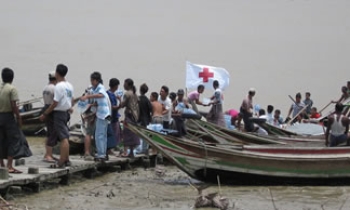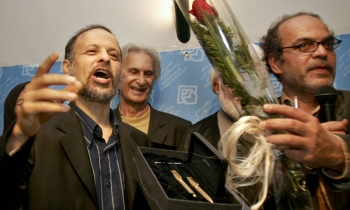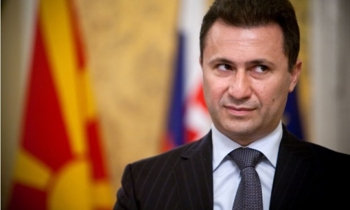The Tunisian government's continuing clampdown on human rights defenders and its intolerance of domestic critics has made a mockery of the UN-sponsored international summit being held in Tunis this week, Amnesty International has said.

The government of President Zine El-Abidine Ben Ali, Amnesty said, shows no signs of relaxing its grip and allowing Tunisians to speak openly about their hopes and aspirations for political and social change. In fact, in the run-up to the summit, the Tunisian government has increasingly turned the screw on its critics, using arrests and imprisonment, censorship and "smear" campaigns by the state-owned media and even physical attacks in the street, Amnesty said in a report "Human rights abuses in the run up to the WSIS".
Despite pledges by President Ben Ali in the run-up to the WSIS to extend press freedom, the report said, the Tunisian press remains strikingly uniform in content and tone, publicising little else than the official government line. The press generally does not report information on the situation of human rights and public liberties emanating from Tunisian or international human rights organizations. The privately-owned newspapers, which according to official statistics represent some 90 per cent of the press, are indistinguishable in tone from the official ones.
Several publications associated with critics of the government have been denied proof of registration by the ministry of the interior and, as a consequence, they cannot be printed in Tunisia. They include Kalima (The Word), a magazine edited by Sihem Ben Sedrine, spokesperson of the National Council for Liberties in Tunisia (Conseil National pour les Libertés en Tunisie, CNLT); Kaws el-Karama (The Arch of Dignity), edited by Jalel Zoghlami, a known government critic; La Maghrebine, edited by journalist Noura Borsali; and Alternatives Citoyennes, edited by Nadia Omrane.

The Amnesty report said Tunisian journalists are required to work under very difficult circumstances and must be careful not to fall foul of the authorities. Censorship is rife and it is believed that many journalists also feel obliged to exercise self-censorship, both journalists working for state media and those employed in the privately-owned media. In March 2004, a group of journalists courageously drew attention to this in a letter that they circulated among government officials and civil society organisations. The letter expressed concern at excessive censorship of their reporting by senior managers overseeing their work, apparently due to pressure from state authorities.
Two months after this letter appeared, some 150 journalists got together to form a new professional association, the Union of Tunisian Journalists (Syndicat des Journalistes Tunisiens, SJT), as an independent body dedicated to defending journalists' rights and promoting media freedom. It was immediately seen as a threat by the government and has been under considerable pressure from state authorities.
The SJT's activities have been subjected to numerous restrictions and its president, Lotfi Hajji, has been repeatedly summoned for questioning by the interior ministry's security department. When he was summoned in August 2005, Hajji was informed by the authorities that the SJT's first congress, due to be held in September 2005, had been banned, but was given no explanation, the report said.
Under the Press Code, the authorities are able to regulate the conditions under which foreign newspapers and other publications are distributed in Tunisia. In practice, they exercise systematic censorship of foreign publications, effectively preventing the distribution in Tunisia of editions of newspapers such as French dailies Libération and Le Monde, and Arabic-language dailies Al-Qods al-Arabi and al-Hayat, when they contain critical reports on Tunisia. In consequence, the London-based al-Hayat is said to no longer send copies to Tunisia because of the level of interference they have experienced at the hands of the authorities.

The report said that Tunisian authorities have also operated systematic Internet censorship since it began to be used as a new medium of communication in and about Tunisia. This has been done outside any legal framework, thereby forestalling the possibility of any legal challenge, and its impact has been significant, as tests conducted over several years by Amnesty International and the Tunisia Monitoring Group (TMG) have shown. For its part, the Tunisian government denies that it censors the Internet, except for websites that contain what it considers "terrorist" content or otherwise affect national security.
From 1999 to 2001 Amnesty International conducted frequent tests, which showed that websites carrying information critical of the government, including international news sites, were rendered inaccessible to Internet users within Tunisia. Amnesty International found that users within Tunisia who tried to access such websites received a standard error message, suggesting that the server had broken down, the network was malfunctioning or the website did not exist. The websites affected included that of the United Nations and its human rights organs, as well as those of international human rights organisations.
Subsequently, when the TMG carried out a further test during an announced visit to Tunisia in 2005, they found that some 20 websites were systematically unavailable in Tunisia, except through providers operating via satellite. The blocked websites were information sources on Tunisia which are independent of the government, including online newspapers which are banned from printing in Tunisia. Some of the blocked sites were operated by political opponents, others by human rights groups and activists. The TMG found that it could access websites of international human rights organizations, but concluded that these may only have been temporarily available during the period of the TMG's visit.

While censoring the Internet on the one hand, the government has also used it to project a positive image of Tunisia as a country where human rights are protected, mounting extensive public relations campaigns using NGOs which are close to the government. For example, in 1998 a website named amnesty-tunisia.org was set up to provide a highly positive image of human rights in Tunisia at the very time that access to Amnesty International's website was being blocked for access by Tunisian users. The government denied any link to those who registered the propaganda website and it was eventually discontinued.
In April 2005, the authorities jailed lawyer and well-known human rights defender Mohammed Abbou for three-and-a-half years for publishing critical articles on the Internet. He was accused under the Penal Code and various articles of the Press Code, and accused too of violent behaviour towards another lawyer, although eye-witnesses to the latter incident declared the charges unfounded and no substantiating evidence was presented other than an unsigned medical certificate. Mohammed Abbou is currently imprisoned at El-Kef, 200 kilometres from Tunis, where his family resides.









